The Womanism, Activism, Higher Education Research Network Conference
by: Kelly Parker , February 6, 2024
by: Kelly Parker , February 6, 2024
Race, Justice, and Activism: ‘Supporting Community: What Should Black Women’s Research Look Like in Times of Adversity?’ was presented by Birkbeck University’s Womanism, Activism, Higher Education Research Network.
Event date: 31 October 2023
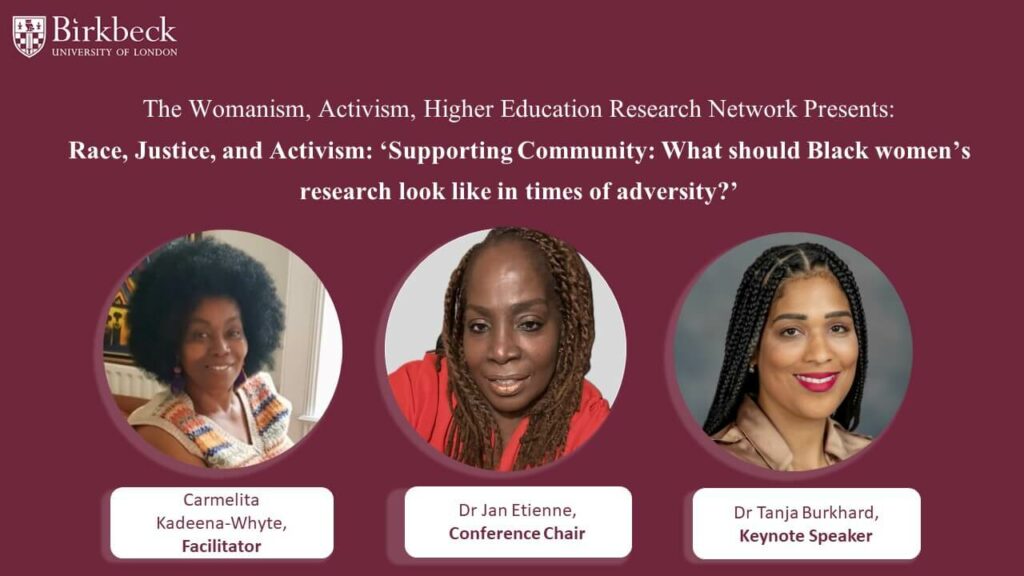
The conference was chaired by Dr Jan Etienne, Honorary Research Fellow at the School of Social Sciences at Birkbeck, University of London, and was facilitated by Carmelita Kadeena-Whyte, artist, Pan-Africanist, and Black Art Trail Cultural activist. The event brought together a participatory collective of British and international scholars and academics to discuss social justice research in education, with a thematic focus on Black women’s research for community. Etienne’s edited book: Communities of Activism: Black Women, Higher Education, and the Politics of Representation (2020) formed the backdrop to this conference.
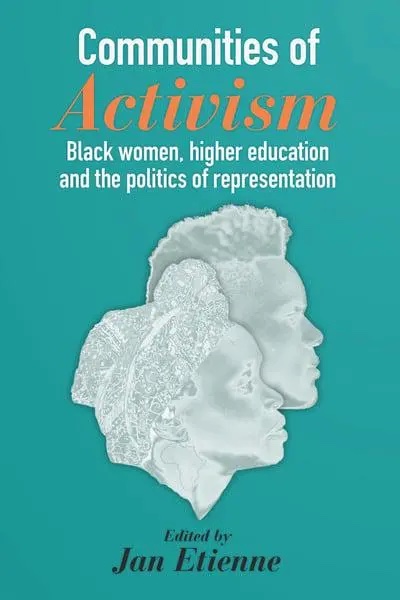
The event was supported by Birkbeck’s Institute for Social Research, who fund the Womanism, Activism, Higher Education Research Network, and a welcome address was provided by its Director, Professor Karen Wells. Etienne gave a background to the conference and noted that last year’s conference, ‘Contemporary Womanist Research Post George Floyd: Compelling Developments in Black Feminist Theory’ (Parker 2022) provided the platform for this year’s thematic focus.
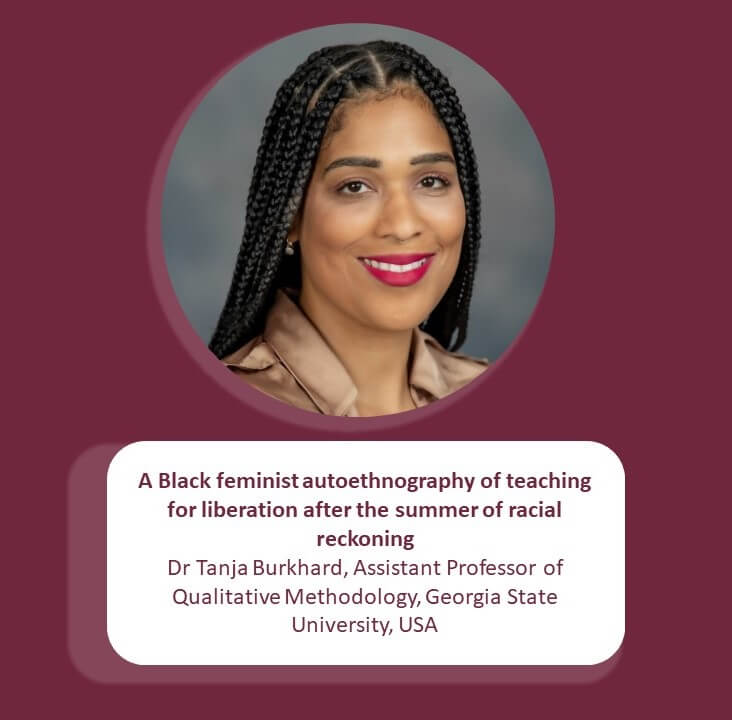
Fig. 3. Parker, Etienne, Birkbeck University, 2023, https://www.bbk.ac.uk/
The keynote address was delivered by Dr Tanja Burkhard, Assistant Professor at Georgia State University’s College of Education and Human Development, Department of Educational Policy Studies. Her talk ‘A Black feminist autoethnography of teaching for liberation after the summer of racial reckoning’ acknowledged the learning benefits from being in community with Birkbeck University’s Womanism, Activism, Higher Education Research Network. Presenting her keynote, Burkhard explained her focus on how to undertake research alongside fellow women of colour that maintains authenticity and ethical integrity. Outlining her own subjectivity as a Black German woman educated in the USA, a mother, and a qualitative researcher, her work examines the intersectionality of race, gender, and immigration. Her talk centred on Race, Justice, and Activism in Literacy Instruction (2019) where she employs Black feminist autoethnographic methods (Griffin 2012, Burkhard 2020) to examine a series of racialised, gendered, and xenophobic incidents in an undergraduate class focused on equity and diversity, in which she was the instructor after the summer of 2020—now often referred to as the ‘Summer of Racial Reckoning.’ The incidents generated severe discomfort in the classroom and revolved around the interactions between a student who is a member of the radical far-right QAnon movement and the instructor, a Black immigrant woman. Drawing on journal entries, e-mails, and other artifacts, she examines the layers of discomfort that arose in the class due to the incompatibility of ideologies that emerged from the instructor’s culturally sustaining pedagogical approaches (Paris & Alim 2014; Wong & Burkhard 2021) and the politicized rhetoric related to race, (im)migration, and child welfare promoted within circles of the QAnon movement. On the one hand, these incompatible ideologies called into question what it means to teach for justice and ‘to create an open learning community’ (hooks 1994: 8); on the other, what it means for instructors of colour to work through layers of violence, fear, and discomfort for themselves and for students of colour within predominantly white classrooms.
Homage was paid to ground-breaking Black feminist scholars June Jordan, bell hooks, and Audre Lorde, whose work has served to inform the way Burkhard considers her own research endeavours. She spoke of her recent incumbency and the challenges faced, which have served to develop her research, with a solid ontological and epistemological grounding. Within this research, Burkhard importantly seeks to challenge ‘white middle-class norms as the standard of knowledge production’ (Burkhard 2023).
The work of critical intercultural communication scholar Professor Rachel Alicia Griffin inspired Burkhard’s use of Black feminist autoethnography, through the necessitation of a commitment to progress towards a position of ‘interrogation, resistance and practice’ (Griffin 2012). This in turn contributes to efforts to develop greater solidarity and awareness towards the oppression which frames and inhibits Black women throughout their endeavours.
In concluding the keynote, Burkhard poignantly cited Patricia Hill Collins: ‘We must be attentive to the seductive absorption of black women’s voices in classrooms of higher education, where black women’s texts are still much more welcomed than black women ourselves’ (Collins 2002). Her interpretation of the implications of this, the questioning of ethical considerations within her own work superseding that requisite of the institution, through maintaining accountability, and paying due acknowledgement to the texts, and therefore experiential discourse, of those within the same community were all striking features of her address.
‘So, it go’: Grief and Bereavement in Caribbean Communities. Debi Lewinson Roberts.
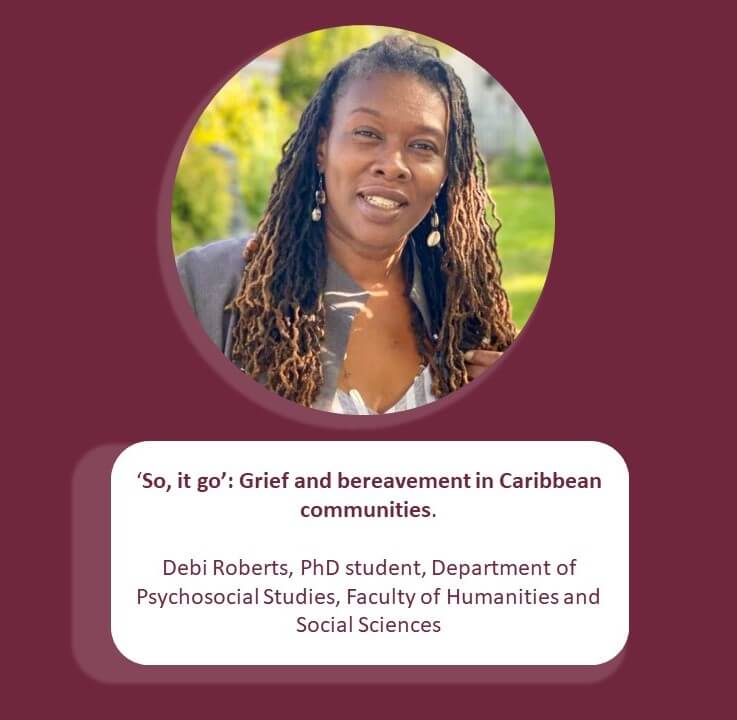
Fig. 4. Parker, Etienne, Birkbeck University, 2023, https://www.bbk.ac.uk/
A PhD candidate from Birkbeck’s Department of Psychosocial Studies, Faculty of Humanities and Social Sciences, Debi Lewinson Roberts presented her current research, ‘‘So, it go:’ Grief and bereavement in Caribbean communities.’ Roberts’ doctoral study uses a Black feminist epistemological lens to explore the dynamics and intersecting narratives within conversations of grief and bereavement in the lives of elderly Caribbeans.
Roberts’ research has been informed by post-pandemic studies undertaken by ‘Good Grief Connects’ (University of Bristol) and The Ubele Initiative (Social Enterprise), which identified that during the COVID-19 pandemic deaths were higher for Black and other marginalised groups (Ubele 2023) compared to their white counterparts. This corresponds to other research noting the vast disparity of deaths in the areas most densely populated by BAME communities (Parker 2020, Raffray 2020). Coinciding this with research from the Marie Curie charity detailing a dearth of awareness and culturally appropriate services, Roberts’ research question proves a natural consequent: how may proposed culturally appropriate support be perceived and achieved?
Observing the benefits of grief as a collective experience, while remaining cognisant of differing traditions across various cultures, Roberts drew on the work of renowned American scholar, professor of Sociology Patricia Hill Collins, whose work specialises in race, class, and gender. Paraphrasing Collins (2002), Roberts noted that individualistically Black people may respond differently to issues of grief, but as a community there are recurrent themes and issues which Black people can identify with and assimilate within their own identities. Continuing the influence of Collins on her own research, Roberts elaborated on the incorporation of her tenets for ‘knowing and validating knowledge’ (2002: 252) to oppose positivistic approaches and oppressive structures. This aligns to Roberts’ relativistic epistemological position, hinging upon the subjectivity of the researcher’s positionality and lived experience. Extending on Collins’ perspective was the commentary that only those who experience particular social norms are positioned to select them as subjects for research. Another element to Roberts’ epistemology is the consideration of evaluating dialogue as claims of knowledge. This approach enables the experience a protective position of narrative, safeguarded from analytical critique. Further still is the ethic of care as composite within this epistemological position. Using the work of Collins (2002) as a framework in which knowledge is value laden, the presence of empathy and compassion is used to test the values within this knowledge.
The employment of a Black feminist epistemology opens a safe space in which the generative conversations within the research are unfettered from fear of judgement or critique by members of dominant groups, consequently empowering participants to speak freely, to capture the rich knowledge and experience within their narrative. The proportional disparity of grief and loss felt within marginalised communities, compounded by the effect of surveillance and a dearth of culturally appropriate bereavement services, inhibits members of these communities’ willingness to talk openly outside of safe spaces. This informs Roberts’ research endeavours, seeking to answer how narrative intersections of grief and loss influence wider themes of community, identity, and spiritual belief among Caribbean elders, and how safe spaces for these conversations may inform action and thought.
Concluding the presentation of this powerful, culturally charged research was the American Professor of Gender, Sexuality, and Feminist Studies Jennifer C. Nash’s reference of Black feminism as an ‘autonomous intellectual and political tradition’ (Nash 2019: 16), one that has been used to develop theory and analytics. Given the centrality of Black women’s role in supporting their community, the final word came from Collins: ‘How do Black women as a collectivity resist intersecting oppressions as they affect us without organising as a group?’ (Hill Collins 2002: 110).
‘Can you see me—do you hear us?’ Refugees and Motherhood in the UK. Nandita Sirker.
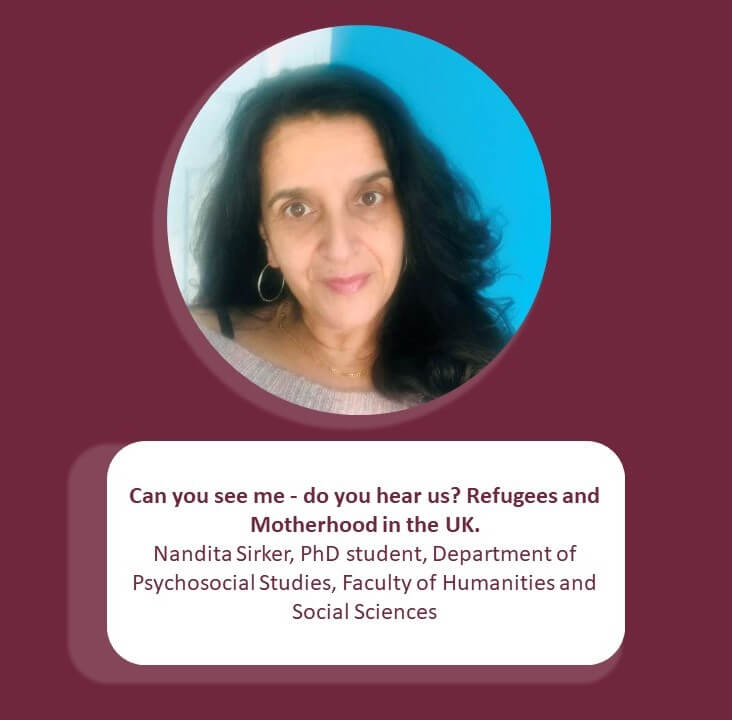
Fig. 5. Parker, Etienne, Birkbeck University, 2023, https://www.bbk.ac.uk/
Nandita Sirker, PhD student at the School of Social Sciences, at Birkbeck, University of London, provided the second presentation, centred on her PhD research. ‘Can you see me—do you hear us? Refugees and Motherhood in the UK’ is a Black feminist exploration of ‘refugeeness,’ motherhood, and social care. Sirker’s research aims to examine how the dominant discourses of race, gender, and ‘refugeeness’ interact with policy and popular culture and how they infringe upon the support mechanisms available to refugee or asylum-seeking mothers, their representation, and the value placed on their voices. Beginning with an investigation of informal support to highlight the gaps within statutory support and the legislative hindrance faced by the group, Sirker’s research considers the enforcement of poverty upon refugees as a deliberate act of whiteness and discriminatory power imbalance against those most disempowered.
Sirker acknowledges that refugee mothers are silenced in discourse and policy, and she explores the intersections of race, class, gender, and religion. Her research question asks: What are the dominant discourses on race, gender, and refugees in public policy and in popular culture and how do these impact on work with refugee mothers?
Her sub questions are:
How do refugee and asylum-seeking mothers define their own needs and are these being heard and responded to?
What can professionals and policy makers learn from this?
Her methodology employs Critical Race and Black Feminist approaches wherein she challenges the role of research and academia in creating, reinforcing, and maintaining discourses of power and erasure. Using narrative methods, interviews, focus groups and autoethnography to champion lived experience, she decentres her privilege as a researcher. Thinking more widely, she questions what we can do to support the community and each other. Sirker’s research ultimately seeks to examine the differences with which refugee groups are perceived in the UK. She postulates that the hostility directed toward refugees of non-white, non-Christian heritage in particular has a dehumanising effect. She addresses the dehumanisation of these refugee groups who arguably have the reductive consequence of stripping away the individuation of each refugee, of gender identity or family position, merely ascribed the status instead of refugee. As with the previous speakers, she makes connections with intersectionality of gender, class, and race, alongside religion. She points out that it is critical in unpacking the impact of this, and to foster a willingness to understand the lens from which refugee women and mothers see the world. Black feminist theory again provides an epistemological standpoint from which to address the objectification and contestation of the Black female body, and to confront inaccurate and harmful labels ascribed to refugee women of colour.
The research does not seek to function as an act of rescue, but rather to provide a platform with which to recognise these important issues at a time when international refuge is increasingly being sought. Sensitive to the messy and complex nature of lives—and particularly the lives of refugees—Sirker seeks to widen acceptance and community through articulating the issues from a personal perspective. She is a former professional with extensive experience in supporting this marginalised group, who are at the very borders of society.
Doing Qualitative Research ‘For’ Community: Exploring ‘Personal Accountability’ and ‘Lived Experience’. Dr Jan Etienne.
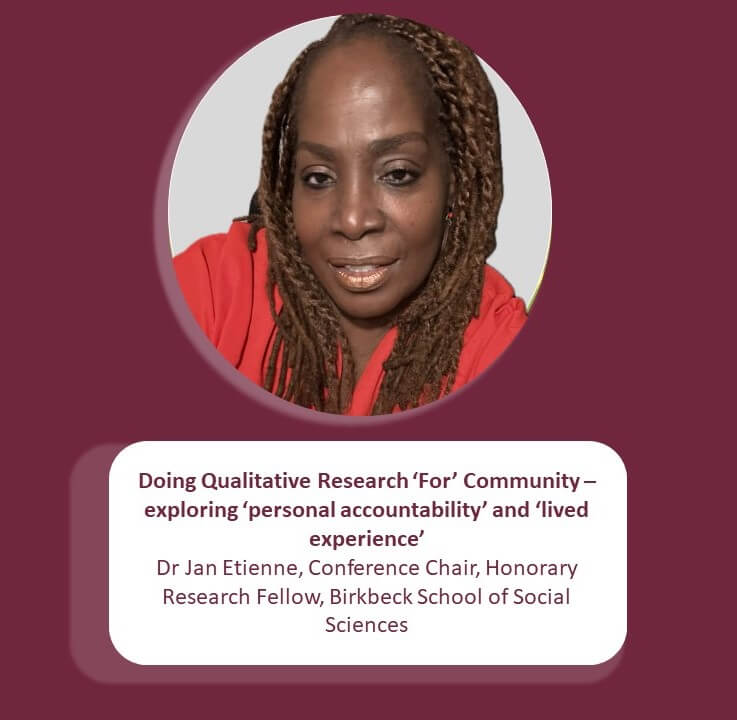
Fig. 6. Parker, Etienne, Birkbeck University, 2023, https://www.bbk.ac.uk/
The concluding talk of the conference was delivered by Dr Etienne. She summarised the developments of Black British feminist research as being akin to a new dawn, wherein the research and writing nuances of Black women are gaining momentum, influencing the structure, and undertaking research as it diverges from traditions historically rooted in white patriarchal practices. Considerations of personal accountability and engagement with lived experience are essential features of Black feminist research, and the emergence of scholastic works in this vein reveals an appetite for much more to come. Etienne praised the work of Peggy P. Warren, a leader in NHS management and development, diversity and inclusion, whose book, Black Women’s Narratives of NHS Work-Based Learning: An Ethnodrama: The difference between Rhetoric and Lived experience (2019) provides compelling narratives of Black women within the NHS. Significantly, this work provides insight into ways of framing Black feminist strategies, and the tools with which exciting, alternative research approaches can be undertaken. Etienne also acknowledged the activist, critical race scholar and educator Dr Angel Jones, author of Street Scholar (2022). Jones redeploys social media in an educational capacity, pursuant to the advocation, education and emancipation from a scholar whose approach is underpinned by ambitions of ‘activism and community uplift’ (Jones 2022).
Thematically, the conference, while firmly centred around community and the importance of Black feminist research as a driver in community cohesion and social mobilisation, also highlighted the necessity of disruptive approaches to academia, erring away from norms and traditions that no longer reflect the social climate, nor aptly serve the researchers previously inhibited by those norms. As an act of resistance, Black feminist research has challenged the status quo without ostracising Black and non-Black feminist researchers; rather it applies to the community of women researchers, academics and scholars who provide support to one another within the patriarchal academy. The varied lenses from which they view their work and position serves to empower and educate; it allows for expansion and re-modelling of data collection. Etienne invited reflection, articulating an understated need for a space with which to come to terms with, and often recover from, the process of attaining one’s doctoral degree, something startingly relevant to the experience of women from Black and marginalised communities when progressing through the academy.
Overall, the conference was a highly informative, well-paced event, presenting research that demonstrated the brevity of, and the scope for, future Black feminist research. The event was a manifestation of a safe space in which discussions, free of surveillance, allowed for participation that reinforced just how far Black feminist research has come, yet how far there still is to go, and the tangible benefits to the academy and society it can yield.
REFERENCES
Birkbeck Institute for Social Research. Birkbeck, University of London (2023) www.bbk.ac.uk (last accessed 8 Nov 2023). Burkhard, Tanja (2022), ‘Facing Post-Truth Conspiracies in the Classroom: A Black Feminist Autoethnography of Teaching for Liberation After the Summer of Racial Reckoning’, Departures in Critical Qualitative Research, Vol. 11, No. 3 (Fall, 2022), pp. 24-39.
Collins, Patricia Hill (2002), Black Feminist Thought: Knowledge, Consciousness, and the Politics of Empowerment, New York: Routledge.
Etienne, Jan (ed.) (2020), Communities of Activism: Black Women, Higher Education and the Politics of Representation, London: UCL, Institute of Education Press/Trentham Books.
Griffin, Rachel Alicia (2012), ‘I AM an Angry Black Woman: Black Feminist Autoethnography, Voice, and Resistance’, Women’s Studies in Communication, Vol. 35 No. 2, pp.138-157.
Jones, Angel, (2022), Street Scholar. Using Public Scholarship to Educate, Advocate, and Liberate, Oxford: Peter Lang.
Murray, Karl & Rolston, Yansie, (2020), ‘Rapid Review of the Impact of Covid-19 on those with Protected Characteristics’, The Ubele Initiative, September 2020, https://www.ubele.org/assets/documents/Ubele-Rapid-Review—VCSE-Analysis-report,-October-2020.pdf (last accessed 9 November 2023).
Nash, Jennifer C. (2019), Black Feminism Reimagined: After Intersectionality, Durham: Duke University Press.
Parker, Kelly (2020), ‘Stay Home, Protect the NHS, Save Lives’ from the Perspective of a Woman of Colour’, MAI: Feminism & Visual Culture 6, Crisis-Connection-Culture: Alternative Responses to Covid-19 (Autumn 2020), https://maifeminism.com/stay-home-protect-the-nhs-save-lives/
Parker, Kelly (2022), ‘Contemporary Womanist Research Post George Floyd…’, Conference Review, MAI: Feminism & Visual Culture 9, Photography and Resistance (Summer 2022), https://maifeminism.com/contemporary-womanist-research-post-george-floyd-conference-review/
Raffray, Nathalie (2020), ‘Coronavirus: Brent has the Highest Number of Covid-19 Related Deaths in the Capital’, Brent & Kilburn Times https://www.kilburntimes.co.uk/news/health/coronavirus-brent-top-for-covid-deaths-1-6636658 (last accessed 20 May 2020).
Warren, Peggy (2019). Black Women’s Narratives of NHS Work-Based Learning: An Ethnodrama, Oxford: Peter Lang.
WHO SUPPORTS US
The team of MAI supporters and contributors is always expanding. We’re honoured to have a specialist collective of editors, whose enthusiasm & talent gave birth to MAI.
However, to turn our MAI dream into reality, we also relied on assistance from high-quality experts in web design, development and photography. Here we’d like to acknowledge their hard work and commitment to the feminist cause. Our feminist ‘thank you’ goes to:
Dots+Circles – a digital agency determined to make a difference, who’ve designed and built our MAI website. Their continuous support became a digital catalyst to our idealistic project.
Guy Martin – an award-winning and widely published British photographer who’s kindly agreed to share his images with our readers
Chandler Jernigan – a talented young American photographer whose portraits hugely enriched the visuals of MAI website
Matt Gillespie – a gifted professional British photographer who with no hesitation gave us permission to use some of his work
Julia Carbonell – an emerging Spanish photographer whose sharp outlook at contemporary women grasped our feminist attention
Ana Pedreira – a self-taught Portuguese photographer whose imagery from women protests beams with feminist aura
And other photographers whose images have been reproduced here: Cezanne Ali, Les Anderson, Mike Wilson, Annie Spratt, Cristian Newman, Peter Hershey
